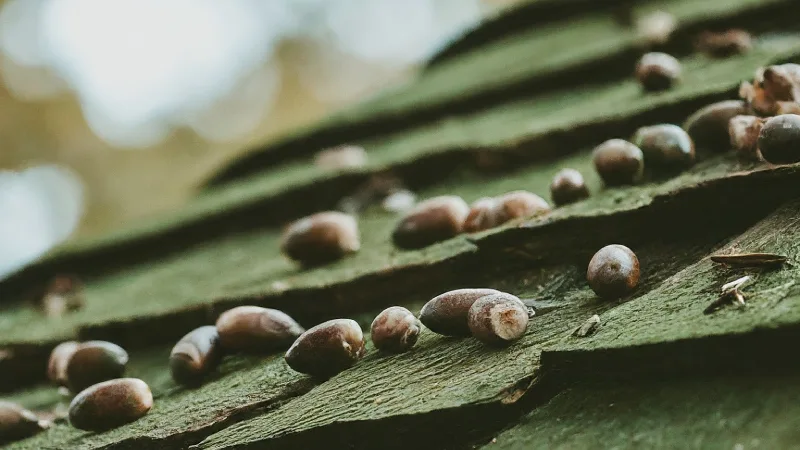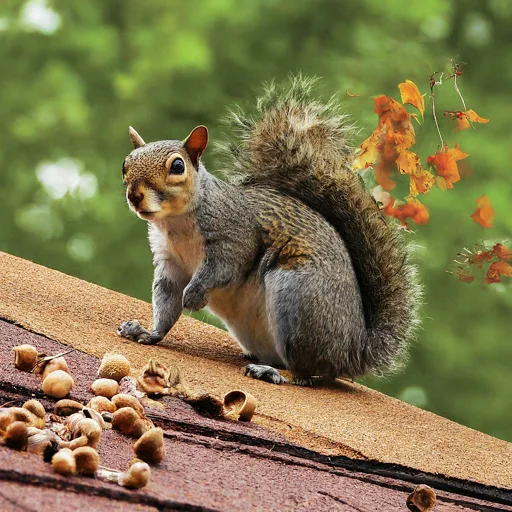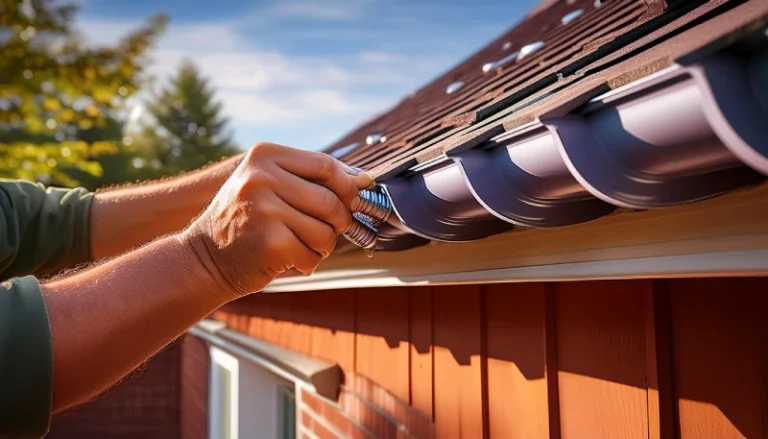Dealing with Acorns Falling on Your Roof: A Comprehensive Guide
Acorns falling on your roof can be more than just a minor annoyance; they can cause damage, create noise disturbances, and lead to further issues if not properly addressed. Understanding the causes and solutions to this problem is essential for maintaining the integrity of your home and ensuring a peaceful living environment.
This article will explore why acorns fall on roofs, the potential problems they cause, and the most effective strategies for dealing with them.
You'll Learn About
Why is it Important to Address the Issue of Acorns Cascading onto Your Roof?
Acorns are a natural product of oak trees and play a crucial role in the ecosystem, providing food for wildlife and contributing to forest regeneration. However, when these acorns fall onto your roof, they can lead to several problems, from physical damage to increased noise.

Homeowners facing this issue need to find effective solutions to protect their homes and maintain a comfortable living environment.
This comprehensive guide will delve into the reasons behind acorn falls, the potential impacts on your property, and various strategies to mitigate the problem. Whether you are dealing with minor annoyances or significant roof damage, understanding your options will help you make informed decisions.
Why Acorns Fall on Roofs?
1.1 The Role of Oak Trees
Oak trees produce acorns as part of their reproductive cycle. Every few years, oak trees experience a “mast year,” where they produce a large number of acorns. This phenomenon is driven by various factors, including climatic conditions and tree health.
1.2 Seasonal Patterns
Acorns typically fall during the autumn months when they mature and are ready to drop from the trees. This natural shedding process can result in significant amounts of acorns accumulating on roofs, particularly in areas with dense oak tree populations.
1.3 Wildlife Activity
Squirrels and other wildlife often transport and store acorns. These animals can contribute to acorns ending up on your roof as they carry them across different areas in search of suitable storage spots.

Potential Problems Caused by Falling Acorns
2.1 Physical Damage to Roofs
Acorns can cause physical damage to roofing materials, especially if they fall from significant heights or if there is a large quantity of them. Over time, this can lead to:
- Shingle Damage: Acorns can crack or dislodge shingles, leading to potential leaks and water damage.
- Gutter Blockages: Accumulated acorns can clog gutters, preventing proper drainage and causing water to overflow, which can damage your roof and home’s exterior.
- Structural Impact: Continuous impact from falling acorns can weaken roof structures, especially if the acorns are large or numerous.
2.2 Noise Disturbances
The sound of acorns falling on the roof can be surprisingly loud and persistent, particularly during windy conditions. This can disrupt sleep and create a constant noise nuisance, affecting the quality of life for those living in the house.
2.3 Increased Pest Activity
Acorns attract wildlife such as squirrels, raccoons, and birds. Increased animal activity around your home can lead to additional issues, including:
- Nesting in Roofs: Animals attracted by acorns may find ways into your attic or roof spaces to nest, causing further damage.
- Health Hazards: Wildlife can bring diseases and parasites into your home environment.
Effective Strategies for Dealing with Falling Acorns
3.1 Tree Maintenance and Pruning
Regular maintenance of the oak trees near your home can significantly reduce the number of acorns that fall on your roof.
- Pruning: Trimming branches that hang over your roof can minimize the direct fall of acorns onto your house. It’s best to hire a professional arborist to ensure that the pruning is done safely and effectively.
- Tree Health: Keeping your oak trees healthy can sometimes reduce excessive acorn production. An arborist can provide guidance on maintaining tree health.
3.2 Installing Physical Barriers
Physical barriers can prevent acorns from accumulating on your roof and gutters.
- Gutter Guards: Installing gutter guards can prevent acorns from clogging your gutters, ensuring proper drainage and reducing the risk of water damage.
- Roof Screens: Mesh screens or netting installed on your roof can catch acorns before they cause damage or create noise disturbances.
3.3 Roof Maintenance
Regular roof maintenance can help mitigate the impact of falling acorns.

- Regular Inspections: This includes scheduling regular roof inspections to identify and repair any damage caused by acorns promptly. Additionally, keeping your roof and gutters clean is essential to prevent acorn accumulation and potential blockages. Sometimes, paint might peel.
- Cleaning: Keep your roof and gutters clean to prevent acorn accumulation and potential blockages.
3.4 Wildlife Management
Managing the wildlife around your home can reduce the number of acorns transported to your roof.
- Exclusion Techniques: Use exclusion techniques to prevent animals from accessing your roof and attic. This includes sealing entry points and installing barriers.
- Habitat Modification: Reducing food sources and nesting materials around your home can discourage wildlife from frequenting your property.
3.5 Soundproofing Solutions
If noise is a significant issue, soundproofing your home can help mitigate the disturbances caused by falling acorns.
- Insulation: Adding insulation to your attic and roof can help dampen the sound of acorns hitting the roof.
- Soundproofing Materials: Use soundproofing materials in the construction or renovation of your home to reduce noise from external sources.
Preventative Measures
4.1 Planning and Planting
If you are planning to plant new trees on your property, consider the placement and type of trees to avoid future problems.
- Tree Placement: Plant trees at a safe distance from your home to prevent branches from overhanging your roof.
- Tree Selection: Choose tree species that do not produce large nuts or acorns to reduce the risk of future issues.
4.2 Regular Monitoring
Keeping an eye on your roof and the surrounding environment can help you address problems before they escalate.
- Seasonal Checks: Conduct seasonal checks, particularly in autumn, to clear acorns from your roof and gutters.
- Wildlife Activity: Monitor wildlife activity around your home and take steps to manage it effectively.
Solutions for Dealing with Acorns Falling on Roofs
| Problem | Solution | Benefits | Considerations |
|---|---|---|---|
| Physical Roof Damage | Tree pruning, roof screens, gutter guards | Reduces acorn impact and accumulation | Requires initial investment and maintenance |
| Noise Disturbances | Soundproofing insulation, soundproofing materials | Reduces noise from acorns hitting the roof | May involve significant renovation costs |
| Gutter Blockages | Installing gutter guards | Ensures proper drainage, prevents water damage | Needs regular cleaning and maintenance |
| Wildlife Management | Exclusion techniques, habitat modification | Reduces wildlife activity and potential nesting | Requires ongoing monitoring and potentially professional assistance |
| Tree Maintenance | Regular pruning and health checks | Reduces number of acorns falling on roof | Needs professional arborist services |
Conclusion
Dealing with acorns falling on your roof requires a multi-faceted approach that includes tree maintenance, physical barriers, regular roof inspections, wildlife management, and potential soundproofing solutions.
By understanding the causes and implementing effective strategies, you can protect your roof from damage, reduce noise disturbances, and maintain a comfortable living environment.
Regular monitoring and maintenance are essential to prevent minor issues from escalating into significant problems. Whether you opt for pruning, installing gutter guards, or soundproofing your home, taking proactive steps will help ensure that your home remains safe and sound despite the seasonal fall of acorns.
While acorns are a natural part of the ecosystem and play an important role in nature, they can be a nuisance when they fall on your roof. With the right strategies and preventative measures, you can effectively manage this issue and enjoy a quieter, more secure home environment.

